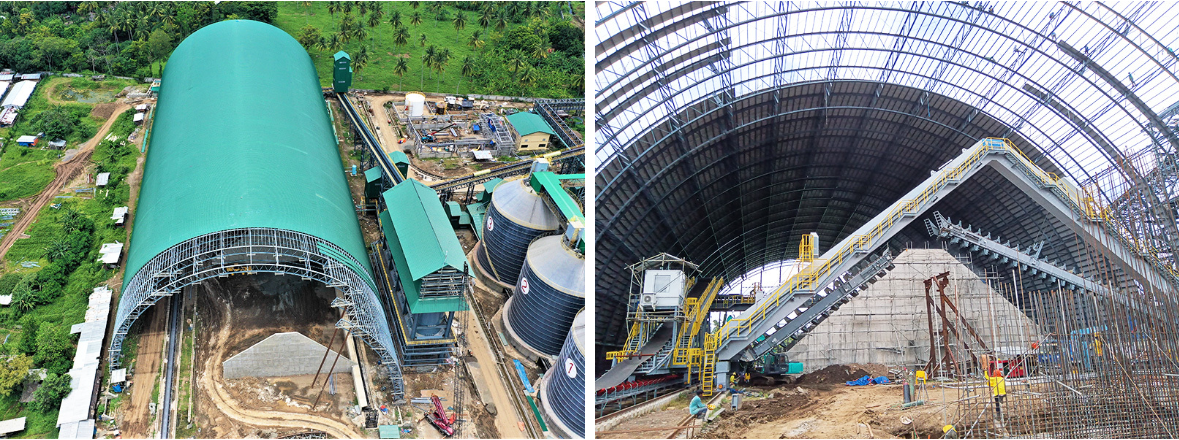Building Materials Industry
Bulk material yards are essential facilities in the building materials industry. They play a crucial role in raw material storage, production process management, and finished product protection. This article will introduce in detail the application of bulk material yards in the building materials industry, focusing on their application, main role and importance of storing materials, as well as the main application forms of bulk material yards in the building materials industry.
Main Materials Stored in Bulk Material Yards
In the building materials industry, bulk material yards are mainly used to store the following types of materials:
Raw materials: sand, cement, lime, clay, gypsum
Semi-finished products: concrete aggregates, cement clinker
Finished products: various ready-mixed concrete, dry-mixed mortar
Additives: fly ash, slag powder, silica fume

Main Functions of Bulk Material Yards
1. Raw material storage: Bulk material yards provide large-capacity storage space for building material production, ensuring production continuity and stability.
2. Production process management: Through rational layout and advanced conveying equipment, bulk material yards can achieve efficient allocation of raw materials, optimizing production processes.
3. Finished product protection: For finished products such as ready-mixed concrete, enclosed bulk material yards can provide a good storage environment, preventing material deterioration.
4. Environmental protection: Modern bulk material yard designs help control dust pollution and reduce impact on the surrounding environment.
5. Quality control: Bulk material yards can achieve zoned storage of different batches and qualities of raw materials, facilitating quality management and ratio adjustments.
6. Cost optimization: Large-capacity bulk material yards can reduce the frequency of raw material transport, lowering transportation and inventory management costs.

Importance of Bulk Material Yards
1. Production guarantee: Bulk material yards are the "material transfer stations" for building material production, crucial for ensuring production continuity and stability.
2. Quality management: Through scientific yard management, raw material quality can be effectively controlled, thereby ensuring the quality of final products.
3. Cost control: Rational use of bulk material yards can optimize inventory management, reduce capital occupation, and control production costs.
4. Environmental friendliness: Modern bulk material yard designs are conducive to controlling dust pollution, meeting increasingly stringent environmental requirements.
5. Efficiency improvement: Automated and intelligent bulk material yards can significantly improve material turnover efficiency and accelerate production pace.
6. Safe production: Standardized bulk material yard management helps reduce safety hazards and ensure production safety.
Main Application Forms of Bulk Material Yards in Building Material Storage
1. Open-air bulk material yards: Mainly used for storing raw materials that are not easily affected by moisture and weathering, such as sand and gravel. These yards have lower costs but need to consider environmental factors and dust control.
2. Enclosed bulk material yards: Used for storing materials that are moisture-sensitive or prone to dust generation, such as cement and lime. Enclosed yards can effectively control dust pollution and improve the plant environment.
3. Automated bulk material yards: Combining stacking machines, reclaiming machines, and other equipment to achieve automatic material stacking and reclaiming. This type of yard can improve operational efficiency, reduce manual operations, and lower costs.
4. Multifunctional bulk material yards: It can simultaneously store multiple materials and are equipped with zoned management systems. These yards are suitable for building material plants that require frequent adjustments of raw material ratios.
5. Intelligent bulk material yards: Integrating Internet of Things and artificial intelligence technologies to achieve intelligent yard management and scheduling. These yards are an important component for realizing intelligent production in the building materials industry.
Bulk material yards play an indispensable role in the building materials industry. They are not only places for material storage but also important facilities for ensuring production quality, improving efficiency, controlling costs, and protecting the environment. With technological advancements and industry development, future bulk material yards will become more intelligent and environmentally friendly, providing strong support for the sustainable development of the building materials industry.
More Solution
Message



